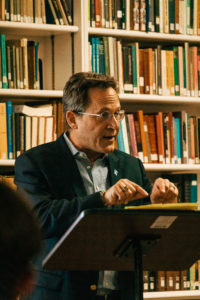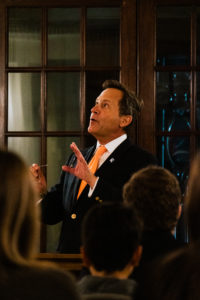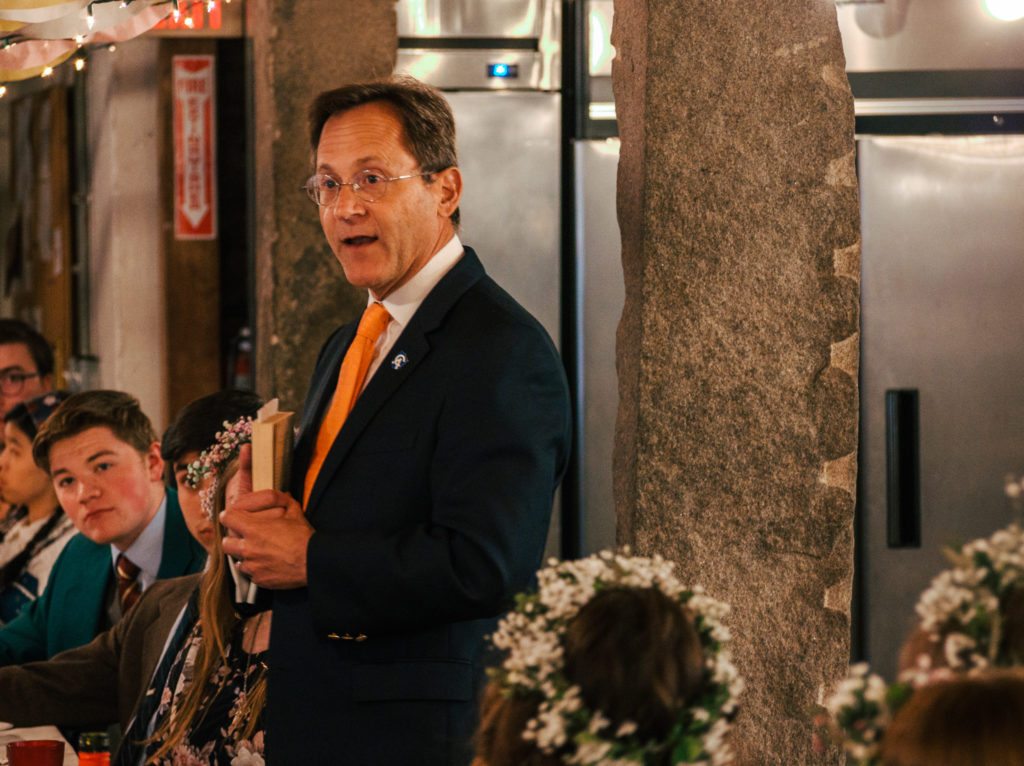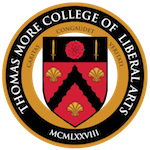By Bridget Ruffing ’22
Christopher Check has been a friend of Thomas More College for many years. He last visited in the spring of 2018, when he delivered the commencement address at graduation. Recently, he returned to deliver a series of talks both on campus and at the Center for the Restoration of Christian Culture. Mr. Check serves as the president of Catholic Answers, an apostolate of Catholic apologetics and evangelization. His work has always been informed by his love for the Catholic faith, the liberal arts, and storytelling.
Mr. Check generously carved time out of his busy schedule to answer a few questions about his work and his thoughts on evangelization and the liberal arts.

You received a classical education. How has that helped you in your work, especially in your role as president of Catholic Answers?
I received a solid formation in my high school years. I went to a school called The Heights, which was located in Washington, DC at the time. Now it is a much larger institution operating in Potomac, Maryland. I learned Latin there, I read a lot of good books, and they provided helpful exams. The most important benefit I received from my high school teachers, however—apart from the knowledge they imparted—was that they taught by their example. They’re all strong men, and they exemplified for me that virility and piety are not exclusive. They taught me that you could be a virile Catholic man, and that lesson has stayed with me ever since.
After high school, I studied English Literature at Rice University. More than any other discipline, it gives us an insight into the human condition and the way humans think. Our stories teach us so many valuable lessons. The best stories, of course, are morality tales. These teach us to make the distinction between good and evil starting from the time we are in the nursery, through the rhymes of Mother Goose and fairy tales. To give another example of this, I have spoken with Dr. Amy Fahey about her great admiration for the works of Sigrid Undset. I had a talk with an old monk who ran a library at a seminary in Italy, who told me that all of moral theology is contained in Kristin Lavransdatter. I really believe that. Stories such as these teach us what we need to know about the moral life.
Stories also tell us where we are from and what we belong to. They tell us what our tradition is, so that we are not deracinated. And that is truly why they are important. I have always had an interest in stories—I loved to read even as a little kid, and that love has stayed with me. While reading is a part of my life that is distinct from the management of Catholic Answers, there are certainly things that I have learned from hearing stories that help me in my work. In fact, most of the speaking that I do really just consists in telling stories. The talk I gave on Galileo was a story, and my talk on the Cristero War, and my talk on St. Gregory the Great—that was a collection of stories. When our Lord wanted to teach, what did He do? He told stories. Stories are the method of instruction par excellence. That conviction very much informs my work.
The liberal arts also teach you how to be a human being; how to have empathy for the people who work for you, for your peers, and even for the people you work for (they might need your empathy most of all). Essentially, the liberal arts teach you how not to be a jerk. They give you humility.
In apologetics, the way someone carries himself matters. You have to have humility. And I believe that you get the most out of the liberal arts if you approach your studies with humility. So, in a way, the liberal arts teach you the humility and docility necessary for becoming a conduit for the Holy Spirit.
–Christopher Check, President of Catholic Answers
 What connections can be drawn between studying the liberal arts and carrying out the work of evangelization?
What connections can be drawn between studying the liberal arts and carrying out the work of evangelization?
While I am not an apologist myself, there are men trained in this work at Catholic Answers. My job is to take care of them and create an environment—the right soil, as it were—where they can be fruitful. These apologists—like Tim Staples, Jimmy Akin, and Karlo Broussard—all have good liberal arts backgrounds. The liberal arts teach you to think clearly, and this is essential to effective apologetics.
There’s something we say a lot at Catholic Answers: you don’t want to win the argument, you want to win the soul. Really, you want Jesus to win the soul. So, when you are evangelizing, what you really want is to be the conduit for the Holy Spirit. Say I meet a non-Catholic, and we strike up a friendship. There will be no amount of exposition I can do that is going to bring him around to believing that a little round wafer is Jesus Christ. But there may be something in my conduct that speaks to him. So, in apologetics, the way someone carries himself matters. You have to have humility. And I believe that you get the most out of the liberal arts if you approach your studies with humility. So, in a way, the liberal arts teach you the humility and docility necessary for becoming a conduit for the Holy Spirit. Docility is a virtue nobody talks about right now, but it is really the aptitude, the capacity to be taught. The arts teach you this virtue in a way that the technical fields do not, because they cover all the aspects of human experience.
Furthermore, you must have a grasp of theology in order to practice effective apologetics. To grasp theology, however, you have to have an understanding of philosophy. You can’t just dive right into theology without comprehending the categories and methods of inquiry. You also need rhetorical skills. Rhetoric is essential to apologetics. The liberal arts teach you all of these skills.
Every bright student who graduates from this school—with the right amount of humility—is going to leaven any place he or she goes. Thomas More students are going to live well where they are, just by giving their example of natural joy and piety.
–Christopher Check, President of Catholic Answers
Any encouraging words for students who are now earning their degrees in the liberal arts and going out into the wider world?
I would encourage students to get a job where they have to work in the presence of other people. I know there is a temptation right now to work remotely. Perhaps it is possible to have a fulfilling life while doing so. However, the Bible says in Genesis 2:18 that “it is not good for man to be alone.” When the pandemic hit California, there was an intense reaction to it. But it soon became clear to me and to my staff that we wanted to be back in one other’s company as quickly as possible.
There’s a lot to be said for propinquity, or nearness to one’s fellows. It’s important to look each other in the eye, punch each other in the arm, and embrace in the hallway. I know that there is a prevailing trend towards remote work and living in different parts of the world for short periods of time: one month in Breckenridge, another in Barbados. But I think we’re not meant to bounce around like that. So I would encourage students to work in the company of other people. It is a real joy for me to work in an office that is full of people who love Jesus Christ. If you can find such a place, it’s very rewarding and gratifying.
Having said that, every bright student who graduates from this school—with the right amount of humility—is going to leaven any place he or she goes. Thomas More students are going to live well where they are, just by giving their example of natural joy and piety. Inevitably, someone will ask them, “What is it that makes you feel joyful?” 1 Peter 3:15 says, “be ready always to give an answer to every man that asketh you a reason of the hope that is in you with meekness and fear” (KJV). So that is another piece of advice: be ready to give a reason for your joy.
I also think the clear thinking skills you develop will be in great demand wherever you go. I work very hard to find people your age who love Jesus and can write! To me, it says so much, because if you can write well, it means you think clearly. It means you have the discipline to do something, because good writing is hard. So cultivate that prose style. And keep saying the Divine Office every day!

What do you think the future holds for Catholic Answers and its evangelization efforts? Do you think liberal arts institutions have a role to play in supporting this mission?
Catholic Answers was founded by my predecessor, Karl Keating, who eventually gave up his law practice to work at the company full-time. He came from a background that continually required him to use rhetoric and debate in the best sense. I have been at the helm since 2015, so for nearly seven years. Until about ten years ago, however, most of the conversations that we took part in at Catholic Answers were with Protestants. We addressed the principal points of disagreement, like justification, the real presence, and confession to a priest.
Now, our audience has considerably expanded. We engage with members of other faiths, like Muslims, but are increasingly finding ourselves in conversations with unbelievers, such as relativists and atheists. And if someone’s a dyed-in-the-wool relativist, there comes a point where you can’t have a conversation with them, because you can’t agree on a first principle. So the reasoning skills that the liberal arts impart make the kinds of people who come out of places like Thomas More really very important to the work of evangelization. They also have a love of liturgy, which is honestly where it all starts—in liturgy and the interior life.
As for the future of Catholic Answers, I think that our work is going to continue to be in mission territory, even beyond those initial conversations with Protestants and atheists and relativists calling in to our radio shows. You and I might sit here and think, how much crazier can it get? But I’m sure it can get crazier, because if you had asked me that question ten years ago, I would have said no, this is it.
These comments have been edited for length and clarity.
For further reading:
